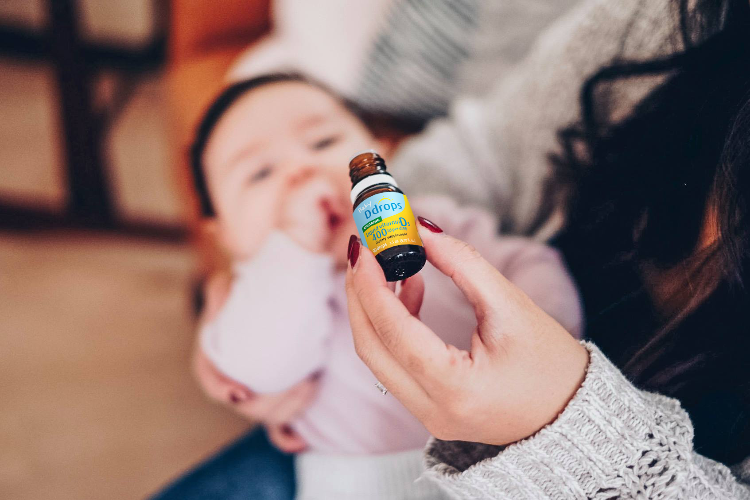*Update 07/21/16: Public Health England has released similar advice for the entire UK population. Read more here. Everyone should consider taking a daily vitamin D supplements, government experts are proposing.
The Scientific Advisory Committee on Nutrition draft guidelines suggests from the age of one, a daily 10 microgram supplement be taken to ensure people get enough, considering the lack of sunshine in the UK. The document highlights the need for recommendations for groups that may not necessarily be at high risk. The current Government recommendation suggests that only at-risk groups, including pregnant women, breastfed babies, and adults aged over 65, need to take supplements. But considering there is no easy way of assessing who is getting enough vitamin D, SACN has proposed a blanket recommendation for everyone. Specifically related to infants, the document states that data are insufficient to set RNIs for infants and children aged 0-3 years.
As a precaution, the safe intake of vitamin D is therefore proposed for these ages: in the range 8.5-10 μg for ages 0 to < 1 year (including exclusively breastfed infants); and 10 ¼g/d for ages 1 to < 4 years. Since it is difficult to achieve the RNI/Safe Intake from natural food sources alone, it is recommended that consideration is given to strategies for the UK population to achieve the RNI of 10¼g/d for those aged 4 years and older and for younger children to achieve a Safe Intake in the range 8.5-10 ¼g/d at ages 0 to < 1 year and 10 ¼g/d at ages 1 to < 4 years.
Experts described the proposed move as an ‘important change’ and a ‘big step forward.’
“Before this, the general assumption was that adults were able to make all the vitamin D they needed from sunshine, and didn’t need any dietary or supplementary intake,” Dr. Adrian Martineau, an expert on vitamin D at London School of Medicine and Dentistry told the Independent.
“SACN was right to say that we can’t rely on sunshine in the UK to meet the Vitamin D requirements. That’s a major and important change.” The plans are now being consulted on until 23 September. If SACN’s draft recommendations are adopted, this could lead to new guidelines for the UK. Follow us on Twitter to stay up to date on the latest vitamin D news.
Everyone should consider taking vitamin D supplements in autumn and winter, public health advice in England suggests. In a report, Public Health England (PHE) advises that everyone needs an average daily intake of 10μg of vitamin D to protect bone and muscle health. This advice is established using recommendations of the Scientific Advisory Committee on Nutrition (SACN) following its recent review of the evidence on vitamin D and overall health.
Previously, only pregnant women and high-risk groups, in the UK have been advised to take a vitamin D supplement. This recommendation expands vitamin D’s advice to the wider general population.
Children aged 1 to 4 years are also included in the advice and should take a daily vitamin D supplement of 10μg to meet the vitamin D requirements.
The guidelines confirm that breastfed babies should get vitamin D drops from birth. Health authorities advise that breastfed babies from birth to one year should be given a daily 8.5- 10μg vitamin D supplement to ensure they get enough. Breastfeeding is strongly encouraged, with recommendations that all infants are exclusively breastfed until 6 months. Data indicates that it is unlikely that exclusively breastfed infants in the UK will maintain sufficient levels of vitamin D. Infants who are formula-fed and receive more than 500ml of infant formula a day do not need any additional vitamin D supplementation, as formula is already fortified with vitamin D.
Additional points outlined in the SACN guidance include:
- Exact vitamin D levels made through exposure to sunlight in the skin are difficult to predict and measure
- It is difficult to obtain daily requirements of 10μg through diet alone. There are foods that naturally contain vitamin D such as oily fish and eggs, and foods that are fortified with vitamin D such as some cereals, but often limited amounts of the vitamin are found in these foods.
- In the spring and summer, most of the UK population should be able to meet their daily vitamin D requirements through sun exposure and a healthy diet.
- Pregnant women should take a supplement containing 10μg vitamin D all year long.
Other groups of people in the UK should also consider taking a vitamin D supplement all year round. These include those who may not receive enough sun exposure in the warmer months making them more at risk for vitamin D deficiency. People who:
- Spend most of their time indoors
- Wear concealing clothing
- Cover their skin while outside or use sunscreen
- Have a darker skin tone
Experts describe the SACN advice as major and important health advice.
“This report is a major step forwards. It will help prevent rickets and other significant medical problems for babies and children in the UK.” said Dr. Benjamin Jacobs, consultant pediatrician at the Royal National Orthopaedic Hospital.
*Updated May 31, 2018




Tinggalkan komentar
Situs ini dilindungi oleh hCaptcha dan berlaku Kebijakan Privasi serta Ketentuan Layanan hCaptcha.